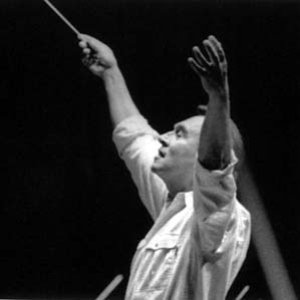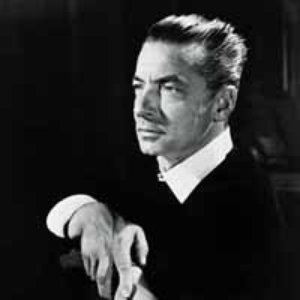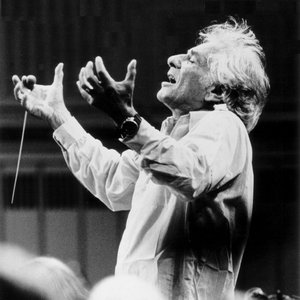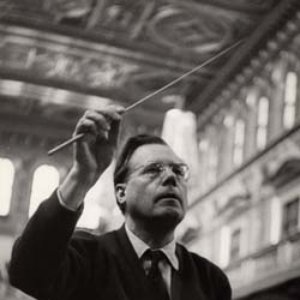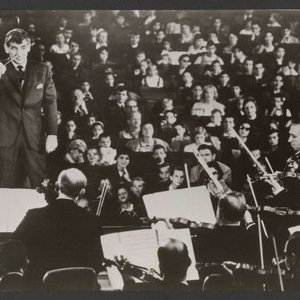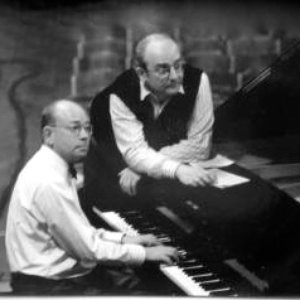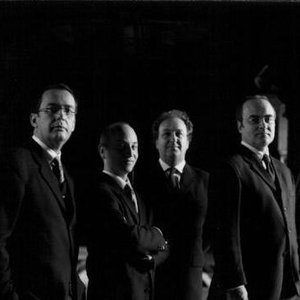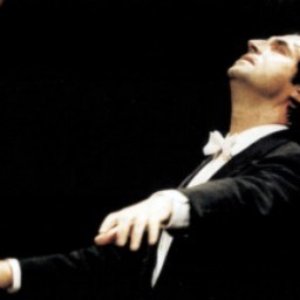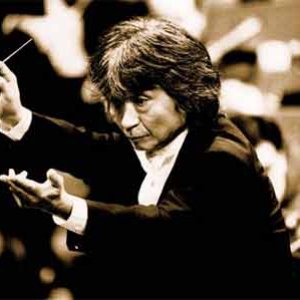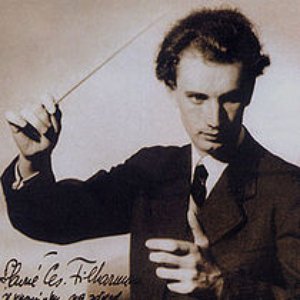Biography
The Berlin Philharmonic (in German: Die Berliner Philharmoniker ), is an orchestra based in Berlin, Germany. In 2006, a group of ten European media outlets voted the Berlin Philharmonic number three on a list of "top ten European Orchestras", after the Vienna Philharmonic and the Royal Concertgebouw Orchestra. Its primary concert venue is the Philharmonie, located in the Kulturforum area of the city. Since 2002, its principal conductor is Sir Simon Rattle. The BPO also supports several chamber music ensembles. The funding for the organization is subsidized by the city of Berlin and a partnership with Deutsche Bank.
The Berlin Philharmonic Orchestra was founded in Berlin in spring 1882 by 54 musicians under the name Frühere Bilsesche Kapelle (literal translation, "Former Bilse's Band"); the group broke away after their previous conductor Benjamin Bilse announced his intention of taking the band on a fourth class train to Warsaw for a concert. The orchestra was given its current name and reorganized under the financial management of Hermann Wolff in 1887. Its first conductor under the new organization was Ludwig von Brenner; in 1887 Hans von Bülow, one of the most esteemed conductors in the world, joined, and from then on, the orchestra's reputation became established, with guests Hans Richter, Felix von Weingartner, Richard Strauss, Gustav Mahler, Johannes Brahms and Edvard Grieg conducting the orchestra over the next few years. Programmes of this period show, surprisingly, that the orchestra possessed only 46 strings as against the Wagnerian ideal of 64.
In 1895, Arthur Nikisch became chief conductor, and was succeeded in 1923 by Wilhelm Furtwängler. Despite several changes in leadership the orchestra continued to perform throughout World War II. After Furtwängler fled to Switzerland in 1945, Leo Borchard became chief conductor. This arrangement lasted only a few months, however, as Borchard was accidentally shot and killed by American forces occupying Berlin. Sergiu Celibidache then took over as chief conductor for seven years, from 1945 to 1952. Furtwängler returned in 1952 and conducted the orchestra until his death in 1954.
His successor was Herbert von Karajan, who led the orchestra from 1955 until his resignation in April 1989, only months before his death. Under him, the orchestra made a vast number of recordings and toured widely. During his leadership, the orchestra grew and gained its fame.
Claudio Abbado became principal conductor after him, expanding the orchestra's repertoire beyond the core classical and romantic works into more modern 20th century works. He stepped down from this post in 2002, to conduct the Lucerne Festival Orchestra. During the post-unification period, the orchestra encountered financial problems resulting from budgetary stress in the city of Berlin. Several years after his departure as chief conductor, in 2006, the Orchestra Academy of the Berlin Philharmonic established the Claudio Abbado Composition Prize in Abbado's honour.
n June 1999, the musicians elected Sir Simon Rattle as their next chief conductor. Rattle made it a condition of his signing with the Berlin Philharmonic that it be turned into a self-governing public foundation, with the power to make its own artistic and financial decisions. This required a change to state law, which was approved in 2001, allowing him to join the organization in 2002. Rattle's contract with the orchestra was initially through 2012. In April 2008, the BPO musicians voted in favour of retaining Rattle as their chief conductor. The current artistic director of the orchestra is Pamela Rosenberg. In April 2008, the orchestra announced that Rosenberg would not continue as artistic director after the expiration of her contract in 2010.
In 2006, the orchestra announced it would investigate its role during the Nazi regime. In 2007, Misha Aster published the book The Reich's Orchestra, his study of the relationship of the Berlin Philharmonic to the rulers of the Third Reich. Also in 2007 the documentary film The Reichsorchester by Enrique Sánchez Lansch about the conduct of the Berlin Philharmonic during the Third Reich was released.
The first concert hall of the orchestra was destroyed during WWII in 1944. Since 1963, the orchestra has been resident at the Philharmonie, which was constructed from 1960-1963, after the design of architect Hans Scharoun. On 20 May 2008, a fire broke out at the Philharmonie. One-quarter of the roof underwent considerable damage as firefighters cut openings to reach the flames beneath the roof. The hall interior did sustain water damage as well, but was otherwise "generally unharmed." The firefighters limited damage by the use of foam. The orchestra was restricted from use of the hall for concerts until at least 2 June 2008.
UNICEF appointed the Berlin Philharmonic Orchestra and Sir Simon Rattle as Goodwill Ambassadors in November 2007.
The current soloists of the Berlin Philharmonic are:
* First Violin: Guy Braunstein, Daniel Stabrawa
* Second Violin: Christian Stadelmann, Thomas Timm
* Violas: Neithard Resa
* Cellos: Georg Faust, Ludwig Quandt
* Basses: Matthew McDonald, Janne Saksala
* Flutes: Andreas Blau, Emmanuel Pahud
* Clarinet: Wenzel Fuchs
* Oboe: Albrecht Mayer, Jonathan Kelly
* Bassoons: Daniele Damiano, Stefan Schweigert
* Horns: Radek Baborak, Stefan Dohr
* Trumpets: Gábor Tarkövi, Tamás Velenczei
* Trombones: Pr. Christhard Gössling, Olaf Ott
On 18 December 2008 the Orchestra announced the creation of a Digital Concert Hall: this new internet platform will enable music fans all over the world to see and hear the Philharmonic’s concerts – live or on demand.
Principal conductors
* Ludwig von Brenner (1882-1887)
* Hans von Bülow (1887-1892)
* Arthur Nikisch (1895-1922)
* Wilhelm Furtwängler (1922-1945)
* Leo Borchard (May-August 1945)
* Sergiu Celibidache (1945-1952)
* Wilhelm Furtwängler (1952-1954)
* Herbert von Karajan (1954-1989)
* Claudio Abbado (1989-2002)
* Simon Rattle (2002-present)
Awards and recognition
Classical BRIT Awards
* 2001 - "Ensemble/Orchestral Album of the Year" - Sir Simon Rattle, Mahler: Symphony No. 10 (EMI, 2000)
* 2003 - "Ensemble/Orchestral Album of the Year" - Sir Simon Rattle, Mahler: Symphony No. 5 (EMI, 2002)
Grammy Awards
* 1970 - Best Opera Recording - Herbert von Karajan, Helga Dernesch, Thomas Stolze, Jess Thomas, Wagner: Siegfried (DGG, 1969)
* 1979 - Best Orchestral Performance - Herbert von Karajan, Beethoven: Symphonies (9) (Complete)
* 1993 - Best Orchestral Recording - Leonard Bernstein, Mahler: Symphony No. 9 (DGG, 1992; recording 1979)
* 1995 - Best Chamber Music Performance - Daniel Barenboim, Dale Clevenger, Larry Combs, Daniele Damiano, Hansjörg Schellenberger, Beethoven/Mozart: Quintets (Chicago-Berlin) (1994)
* 1998 - Best Small Ensemble Performance - Claudio Abbado, Hindemith: Kammermusik Nr. 1 mit Finale 1921, Op. 24 No. 1 (with members of Berlin Philharmonic Orchestra) (EMI, 1996)
* 2000 - Best Classical Vocal Performance - Claudio Abbado, Anne Sofie von Otter, Thomas Quasthoff: Mahler: Des Knaben Wunderhorn (DGG, 1999)
* 2001 - Best Orchestral Performance - Sir Simon Rattle, Mahler: Symphony No. 10 (EMI, 2000)
* 2007 - Best Instrumental Soloist(s) Performance With Orchestra - Antonio Pappano, Leif Ove Andsnes: Rachmaninov, Piano Concertos 1 & 2 (EMI, 2006)
Gramophone Awards
* 1981 - "Opera Recording of the Year" - Herbert von Karajan, Wagner: Parsifal (DGG, 1980)
* 1981 - "Orchestral Record of the Year" - Herbert von Karajan, Mahler: Symphony No. 9 (DGG, 1980)
* 1984 - "Record of the Year" - Herbert von Karajan, Mahler: Symphony No. 9 (DGG, 1984; live recording 1982)
* 2000 - "Orchestral Record of the Year" - Sir Simon Rattle, Mahler: Symphony No. 10 (EMI, 2000)
* 2004 - "Concerto" - Mariss Jansons, Leif Ove Andsnes, Grieg: Piano Concerto and Schumann: Piano Concerto (EMI, 2004)
* 2006 - "Record of the Year" - Claudio Abbado, Mahler: Symphony No. 6 (DGG, 2005)
ECHO (formerly Deutscher Schallplattenpreis) of Deutsche Phono-Akademie
* 2003 - Chorwerkeinspielung - Sir Simon Rattle, Rundfunkchor Berlin, MDR-Rundfunkchor Leipzig, Ernst-Senff-Chor Berlin, Karita Mattila, Anne Sofie von Otter, Thomas Moser, Philip Langridge, Thomas Quasthoff: Schoenberg, Gurrelieder (EMI, 2002)
* 2006 - Musik-DVD Produktion des Jahres - Sir Simon Rattle, Thomas Grube and Enrique Sánchez Lansch (director), Uwe Dierks (producer): Rhythm Is It! (2005)
* 2006 - Sinfonische Einspielung - Claudio Abbado: Mahler, Symphony No. 6 (DGG, 2005)
Timbre de Platine (Platinum Stamp) awarded by Opéra International magazine
* 1987 - Riccardo Muti, Mozart: Requiem (EMI, 1987)
Artist descriptions on Last.fm are editable by everyone. Feel free to contribute!
All user-contributed text on this page is available under the Creative Commons Attribution-ShareAlike License; additional terms may apply.
